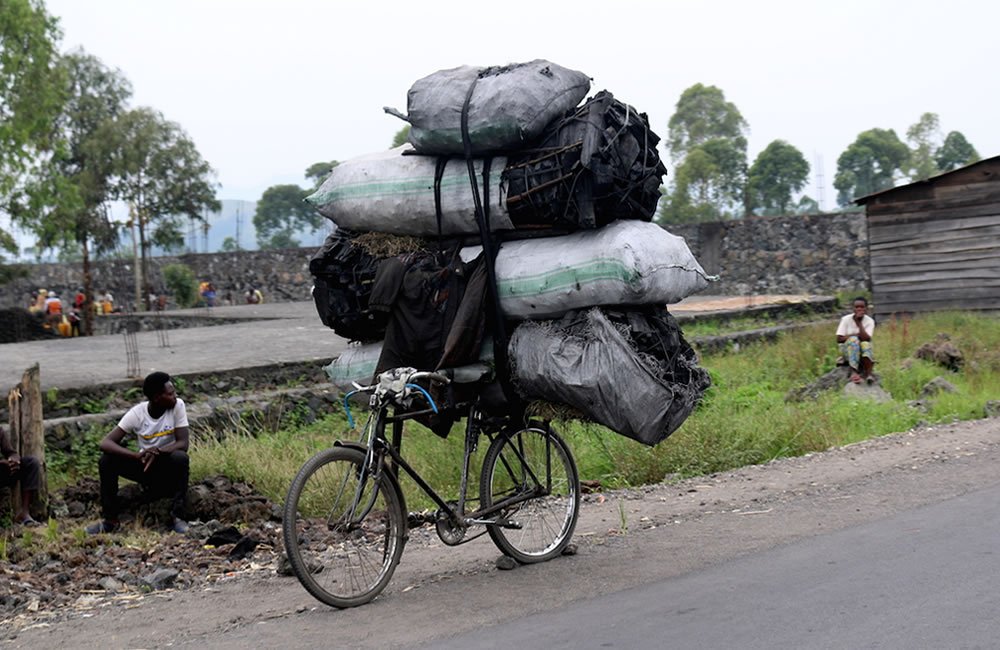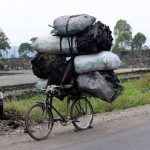Find out why illegal charcoal production in Virunga National Park has become the #1 threat to the survival of the mountain gorilla — and most importantly, what you can do to stop it!
Charcoal: The Mountain Gorillas’ Biggest Threat
The mountain gorilla is in a fight for its very existence – and time is short. Although disease, illegal animal trade, and poaching for bushmeat are major threats to the survival of mountain gorillas, Enemy #1 is the illegal charcoal trade.
How Charcoal Threatens Mountain Gorillas
In the areas around the mountain gorillas’ home in Virunga National Park, there are as many as 1000 people living per square mile. Just a few kilometers south sits the booming town of Goma, where 700,000 people now live and where the population is growing at an alarming rate of 15% per year. Nearly all of these people cook and heat with illegal charcoal made from the forests of the Virunga National Park – home to the world’s last mountain gorillas. The rate of deforestation caused by charcoal production is astounding. Last year alone, 20% of the park’s southern sector was deforested. It is almost inconceivable that so much devastation could be wrought on such a special place in so short a time. But, the sad fact is, it is indeed happening, and the mountain gorillas of Virunga are set to pay the ultimate price.
The mountain gorillas’ home BEFORE the effects of illegal charcoal production (photo: Paul Taggart)
The mountain gorillas’ home AFTER illegal charcoal producers have left
What Can Be Done to Stop Illegal Charcoal Production
The people of North Kivu are in dire need of an alternative to charcoal, but until there is an alternative, the tree cutting will continue. Many alternatives have been tried, but none have been appropriate for the desperately poor populations living in the area. These fuels have either been too expensive or required massive investments in infrastructure, which neither government nor local NGOs could afford. But Africa Conservation Fund believes the answer may be right in front of us in the form of non-woody biomass and organic waste.
Non-woody briquettes: A gorilla-safe fuel whose raw materials (grass and leaves) exist in abundance
Biomass Briquettes: A Viable Solution
Biomass briquettes are made from the likes of leaves, grass, coffee husks, sawdust, and scrap paper. They are pressed into briquettes using simple wood presses that can be made anywhere with a minimal amount of tools. Most importantly, no trees have to be cut to make briquettes — and local trials have proved them to be a readily acceptable alternative to charcoal. In fact, many of our test users preferred them to charcoal because they get hot faster, which puts meals on the table quicker.
North Kivu Biomass Briquette Project
Leveraging the Legacy Foundations years of experience in briquette making around the world, we have embarked on an ambitious initiative to rapidly introduce biomass briquettes as an alternative fuel. We are currently working with community organizations throughout the N. Kivu region, training them on how to make briquettes, as well as how to run a briquette making enterprise. Africa Conservation Fund identifies viable groups, puts them through 3-day training classes, and then donates a press making outfit to them. As an incentive, ACF has offered to buy up to five presses per organization if they can demonstrate that each new press that comes online is producing 10,000 briquettes per month (the average person requires two briquettes per day). We must reach the necessary critical mass to make briquettes a viable player in the household fuel market – AND WE NEED YOUR HELP!
Save a Mountain Gorilla — Help Fund the Biomass Briquette Project
If you really want to save the mountain gorilla, help us fund the biomass briquette project. By supporting this project and our rangers, you will bring hope to Virunga’s last mountain gorillas. To create an entirely new sustainable energy sector within the N. Kivu province it’s going to cost $342,000. It’s a massive undertaking, but if each of us spreads the word to our extended communities, the burden can be share and the goal met. This money will be used whose total population is fast approaching 5 million. Remember, 100% of your money will go straight to helping villages make this vital transition to biomass briquettes and most importantly, to saving the mountain gorilla from certain extinction.
What your donations help purchase
Complete briquette press setup – $250: Briquette press, mixing basins, plastic tarps for work area, compost containers, woven sacks for hauling biomass – a set-up is capable of producing 10,000 briquettes per month (or) enough fuel to get 166 people off of charcoal.
Community hammer mill for preparing organic material – $250: Hammer mills are used to chop leaves, grass, and other organic material into fine pieces so they can be composted and used to make briquettes. One hammer mill can support ten press operations.
One week of fuel for program truck – $100: Our program truck takes the community hammer mill to different press operations, as well as delivers biomass such as sawdust and scrap paper, and brings briquettes to market.
One week of fuel for motorcycle – $50: The briquette making trainer travels between Goma and Katale each week conducting training seminars and checks up on new operations.
Tarps for each workshop roof – $30.00/press group: Tarps are needed to create a dry work environment for workers, and for keeping feed stocks and finished briquettes dry.
Composting set-up: -$30/press group: Composting breaks down the lignin in leaves and grasses so they will compact into a briquette. Composting also breaks down chlorophyll which is carcinogenic when burned.
Improved stoves for new press team (8) – $28.00/press group: Briquettes burn best in a our primitive “bucket” stoves. Each graduating member gets a stove and a supply of briquettes so they can start cooking with briquettes and market our product to others.
Woven sacks for hauling biomass (9) – $8: Upon graduation, each press team is given nine sacks of biomass to get them started.


